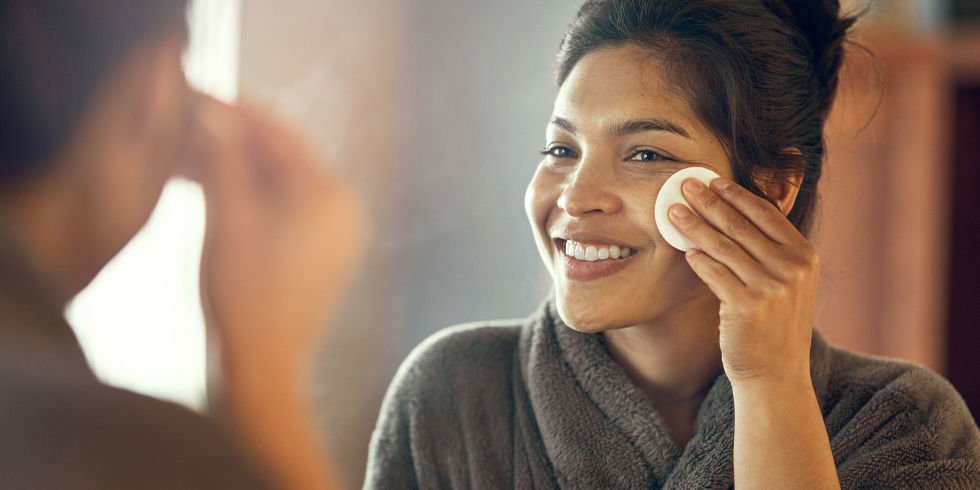
Whether it’s going to bed with some (or all) of your make-up, not drinking enough water or forgetting the benefits of eye cream, we all make skincare mistakes from time-to-time. However, some mistakes could be worse than others when it comes to the health of your skin. Dermatologist Dr. Justine Hextall, on behalf of The Harley Medical Group, explains what she believes could be getting in the way of better skin:
1. Over-complicating your skincare routine
“I would say 50% of those I see in my clinic have too complicated a regime that is actually damaging the skin barrier and unbalancing the natural acidic pH. The offering of skincare today is bigger than it’s ever been before and people have become a lot more experimental, particularly now with access to social media accounts focused on skin care and beauty advice.
“I advise caution as sometimes I see problem skin among girls in their 20s and 30s, purely as a consequence of constantly switching up products and over-zealous skin care regimes. My advice is find what works and try to stick to it for longer than a week! Products can take at least six weeks to start making a difference and also keep in mind that continued use is necessary to maintain the results, you have to remain committed to achieve the results you want!”
2. Not adapting your skincare routine to your age
“There’s no doubt that your skin will change as it ages. The skincare regime you used in your twenties will not necessarily continue to be right for your forties if you’re looking to maintain that youthful glow. In our twenties, we often still see so-called teenage skin with oiliness and occasional breakouts. Often, however, it is the decade that most individuals feel is the peak of skin health. Robust skin that is relatively hardy, has that youthful glow and for most the end of acne.
“By our thirties we usually start to notice those early subtle signs of ageing skin. For example, skin becoming a little less hydrated, for some it may be the first time they have needed to use a moisturiser. Dynamic wrinkles we see in our twenties become a more fixed with the development of fine lines.

“By our forties I believe our skin starts to reflect our lifestyle and skin care. Individuals start to notice increased dryness as the skin barrier becomes less efficient. Loss of skin firmness and age spots and visible thread veins are a common complaint. It is time to invest in good skin care products. I regularly use an antioxidant serum and focus my diet on antioxidant foods. Again, a high factor sun block is very important and I would advise most individuals would benefit from more active treatments.”
3. Nope, your skincare routine can’t un-do lifestyle choices
“Your skincare alone will not automatically fix your skin concerns. In my view, the gold standard of good skin is a healthy lifestyle, a respectable diet and a skincare regime that’s tailored to you. My top four lifestyle factors that do the skin the most damage are UV exposure, smoking and excessive alcohol, city living (with increased exposure to pollution) and chronic stress, especially if combined with lack of sleep will all contribute to skin ageing. No matter how hydrating your chosen moisturiser is, it will not reverse the dehydrating effects of smoking. If you want good skin, you have to look to address these lifestyles factors as well.”
4. Not incorporating facials in to a routine
“As we get older, I am a firm believer that skin treatments can be very beneficial for keeping a youthful glow. A regular facial to remove dead skin cells and hydrate skin works wonders. Micro-needling treatments, especially when combined with hydrating agents such as hyaluronic acid and anti-oxidants can really boost skin glow. The key is to meet with a skin care specialist and plan a treatment programme, that includes the best possible skin care regime for your skin.”
5. Having facial treatments in isolation
“If you’re looking to address lines and skin tone with Botox and fillers, I believe this can have a significant impact on slowing the effects of skin ageing. However, I also feel that treatments in isolation such as lip augmentation, can make the face look unbalanced. I believe it’s really important to consult a certified practitioner to get their opinion and discuss the different treatments options available, in order to achieve the results you want.
“Safety is the key here and as I always advocate less is more. Injecting small amounts of a safe filler, such as Juvederm, and adding more after two weeks if required is always the best approach in my view.”
[“source=netdoctor”]
